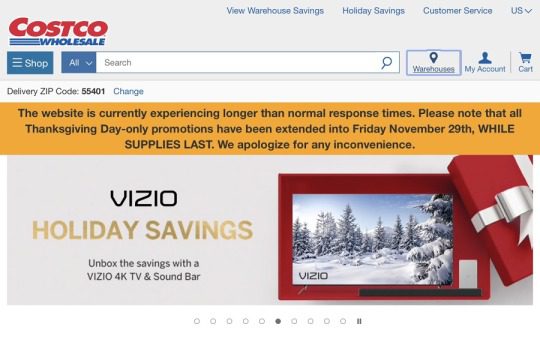Costco’s e-Commerce site went down for more than 16 hours on Thanksgiving Day, impacting an estimated 2.65 million customers who were trying to access the web site and creating sales losses that neared $11 million. (Nordstrom Rack and H&M also experienced technical difficulties, but neither was of the duration of Costco’s.) Costco acknowledged on its home page that its site was “currently experiencing longer than normal response times” during the day and even extended its Thanksgiving Day-only promotions into Black Friday. But besides apologizing “for any inconvenience” on its home page, the company operated in a business-as-usual mode, with no subsequent acknowledgement of the outages even as more coverage of the site issues occurred.
The RTP editors discuss whether Costco’s response to the site outages was satisfactory, or if the retailer should have made more effort through other channels to address and clarify the issues at hand.
Adam Blair, Editor: Any retailer can suffer a site outage or even just a slowdown, and it’s never a good thing. But it’s much worse when the glitch occurs during the busiest shopping days, when sales volumes — and consumer/media scrutiny — are at their peak. Given this reality, it’s remarkable that a savvy retailer like Costco didn’t have a comprehensive communications response plan all ready to go, one that: 1. Acknowledges the problem and apologizes for the inconvenience; 2. Reassures consumers that it’s being worked on; and 3. Includes triggers for make-goods based on the length of the downtime. It’s possible Costco’s radio silence in this case came from simply wanting to put the episode behind it, in hopes that it would fade from people’s consciousness. However, I think it’s more likely that Costco didn’t have a plan — or that the plan they had wasn’t effectively executed. If that’s the case, it’s not just a PR and lost sales issue; it’s an operational and corporate governance issue. Now is the time for every retailer to review not just what is supposed to be communicated when disaster strikes, but exactly how that message will get out to the public.
Glenn Taylor, Senior Editor: When I saw the news of the Costco outages, it brought my mind back to the Macy’s data breach from earlier in November. Although this scenario is a far more serious issue than Costco’s from a sheer customer trust standpoint, Macy’s went out of its way to send out a comprehensive letter to shoppers, revealing important info such as the results from the investigation; the day the retailer was alerted of the incident; what kind of information was involved in the breach; the steps Macy’s took to report this issue; and what shoppers should do in the wake of the breach. Costco’s issue wasn’t about personal information, so the retailer may not have felt as compelled to give shoppers every answer after the event had passed, but the angry social media posts in its wake suggest that quite a few shoppers wanted some kind of response. At the very least, the company could have given a Cyber Monday status update, designed to give consumers confidence that they could shop on the site hassle-free throughout the day.
Bryan Wassel, Associate Editor: I honestly think Costco handled the outages well, given the situation. Releasing an apology, whether during Black Friday or in the aftermath, would just attract more scrutiny and grab headlines that would prevent people from even bothering to visit the site. The response may not have seemed like much, but at least it didn’t further fuel the anger over the downtime: it’s easier to make a viral social media post or a quick-and-easy news story if you have some sort of quote as a jumping off point. Angry status updates mocking what would inevitably be seen as an underwhelming response to the issue on Costco’s part would have gotten much more attention than claims that random users had a hard time. It may be that a proper PR plan would have been able to defuse these challenges, but at a super-busy time like Black Friday, no news may be the best news.







